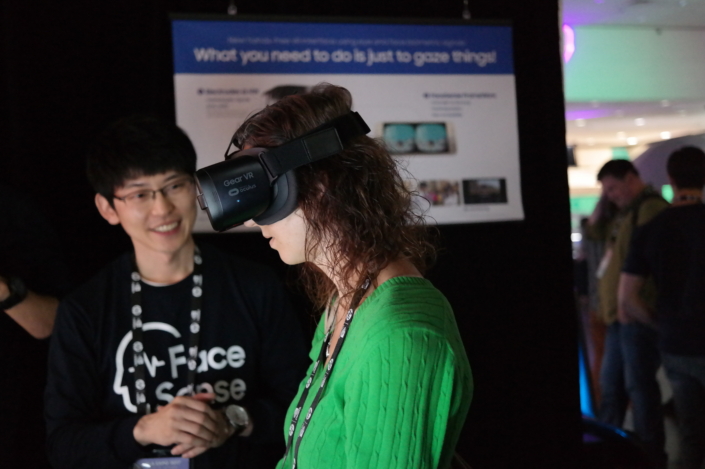Samsung Teases Biometric 'FaceSense' VR Controls
How should you navigate virtual interfaces? Right now the answer is via gamepads, motion controls, and other hand-based inputs. Samsung has teased a different solution called FaceSense, and as its name implies, it allows you to control VR experiences by monitoring your face's movement.
FaceSense was developed by the C-Lab startup business program inside Samsung. The system works by measuring electrical signals generated when you look around, speak, or change your facial expression. That data is then "translated" into commands for the Gear VR HMD, which in turn allows you to experience VR without moving your hands. FaceSense can respond to voice commands, too, which could make some tasks easier to perform.
Samsung offered a sneak peek at FaceSense at the VRLA conference earlier this month. There, it showed off an early version of the system that could respond to facial movements and recognize a limited number of words, such as "home," "back," "select," and "cancel." The company said in a blog post that this could just be the beginning for FaceSense:
The prototype showcased at the exhibition was designed for Samsung’s Gear VR headset, and may one day lead to the development of further biometric technologies that allow more individuals, including those with various usage impediments, to enjoy immersive VR experiences.
That statement highlights FaceSense's greatest potential: offering a way for people with a limited range of movement to enjoy VR. Many current systems focus on motion controls because they can be more immersive than using a gamepad, but if someone can't use a motion controller, they might not be able to enjoy VR experiences in which they're interested. Motion control in VR is exciting; it can also be exclusionary.
FaceSense could also offer another way for people to control VR experiences. As headsets become smaller and less reliant on other devices, being able to navigate an interface with your face (that sounded weird) might let you leave the motion controllers at home or experience VR in cramped areas. Motion control will probably always reign supreme, but that doesn't mean companies like Samsung can't experiment with other input methods.
Get Tom's Hardware's best news and in-depth reviews, straight to your inbox.

Nathaniel Mott is a freelance news and features writer for Tom's Hardware US, covering breaking news, security, and the silliest aspects of the tech industry.
-
Malicex64 Will it sense the panic and horror in someone's eyes when the slab of C-4 strapped to their head starts smoking and call the fire department? :-)Reply -
Ross_30 hmmm i dont know if samsungs gunna perform well in the VR game. But we'll have to wait and see, this looks pretty interesting tbhReply
